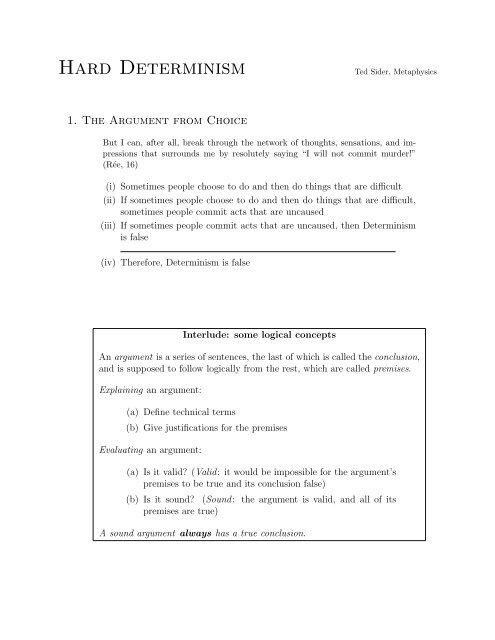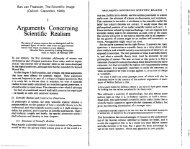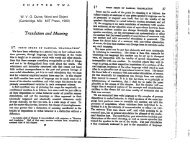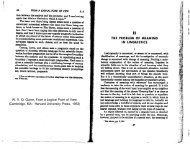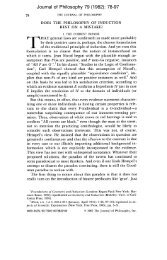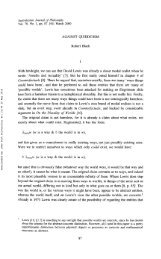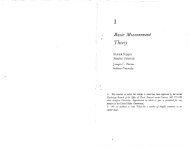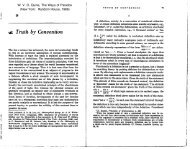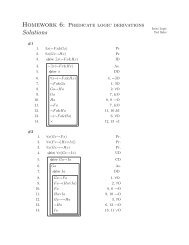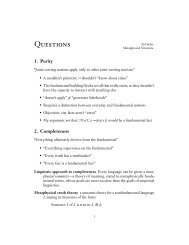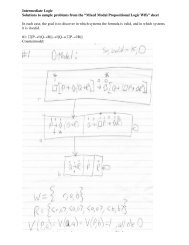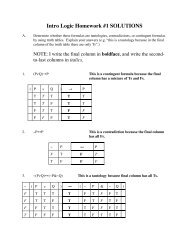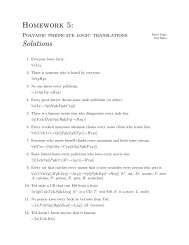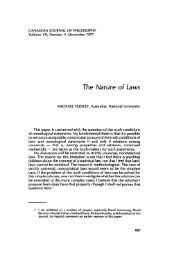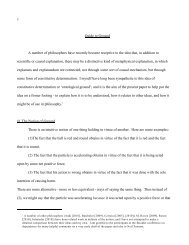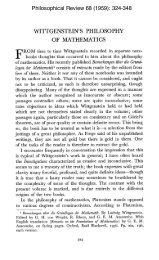Hard Determinism - Ted Sider
Hard Determinism - Ted Sider
Hard Determinism - Ted Sider
Create successful ePaper yourself
Turn your PDF publications into a flip-book with our unique Google optimized e-Paper software.
<strong>Hard</strong> <strong>Determinism</strong> <strong>Ted</strong> <strong>Sider</strong>, Metaphysics<br />
1. The Argument from Choice<br />
But I can, after all, break through the network of thoughts, sensations, and impressions<br />
that surrounds me by resolutely saying “I will not commit murder!”<br />
(Rée, 16)<br />
(i) Sometimes people choose to do and then do things that are difficult<br />
(ii) If sometimes people choose to do and then do things that are difficult,<br />
sometimes people commit acts that are uncaused<br />
(iii) If sometimes people commit acts that are uncaused, then <strong>Determinism</strong><br />
is false<br />
(iv) Therefore, <strong>Determinism</strong> is false<br />
Interlude: some logical concepts<br />
An argument is a series of sentences, the last of which is called the conclusion,<br />
and is supposed to follow logically from the rest, which are called premises.<br />
Explaining an argument:<br />
(a) Define technical terms<br />
(b) Give justifications for the premises<br />
Evaluating an argument:<br />
(a) Is it valid? (Valid: it would be impossible for the argument’s<br />
premises to be true and its conclusion false)<br />
(b) Is it sound? (Sound: the argument is valid, and all of its<br />
premises are true)<br />
A sound argument always has a true conclusion.
We must . . . not lose sight of the fact that a resolute “I will” or “I will not” is . . . a<br />
necessary result; it does not by any means exist without a cause. . . [It is] possible<br />
for a resolute “I will not commit murder” to assert itself. But is it conceivable<br />
that this “I will not” should occur without a sufficient cause? Fear, pity, or some<br />
other feeling, which in turn is an effect, overcomes him and gives rise to this “I will<br />
not” before the cause of the murder has yet become complete. Perhaps Christian<br />
missionaries have had an influence upon him; hence the idea of a deity that will<br />
visit retribution on him for murder comes before his soul. . . (Rée, 16-17)<br />
2. Argument from the Feeling of Freedom<br />
(i) Sometimes we feel as if we act uncausedly<br />
(ii) If (i), then sometimes our acts are uncaused<br />
(iii) If sometimes our acts are uncaused, then <strong>Determinism</strong> is false<br />
(iv) Therefore, <strong>Determinism</strong> is false<br />
We do not perceive the causes by which our volition is determined, and that is<br />
why we believe that it is not causally determined at all. (Rée, 19)<br />
Perhaps the one I took was a bit closer to me, or some other trivial matter, which<br />
would be very difficult to discover and is of the kind that almost never enters our<br />
consciousness, tipped the scales. If I now look back but do not see why I took that<br />
particular egg, then I come to think that I could just as well have taken the other.<br />
(Rée, 19)<br />
3. The Argument from Moral Responsibility<br />
(i) If <strong>Hard</strong> <strong>Determinism</strong> is true, then no one ever does anything freely<br />
(ii) If no one ever does anything freely, then no one is ever morally responsible<br />
for anything<br />
(iii) Sometimes people are morally responsible for their actions<br />
(iv) Therefore, <strong>Hard</strong> <strong>Determinism</strong> is not true


